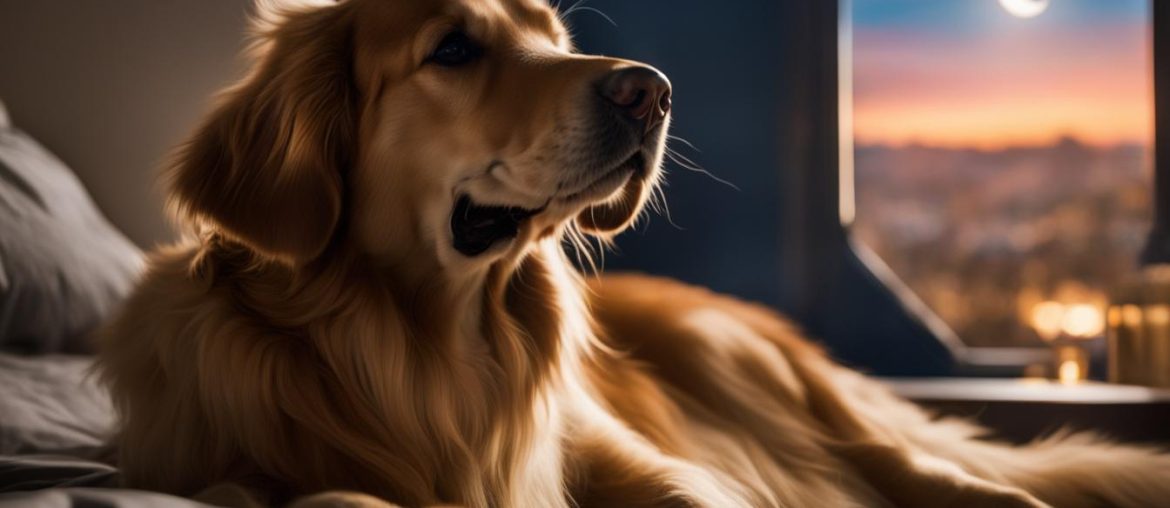Dogs pant for various reasons, including cooling themselves down and alleviating anxiety. However, if your dog is panting heavily at night in a cool environment, it could be a sign of an underlying issue. In this article, we will explore the top reasons why dogs pant at night and provide insights on how to address this behavior.
Key Takeaways:
- Panting in dogs is a normal mechanism to regulate body temperature.
- Panting at night can also indicate stress or discomfort.
- Respiratory issues, anxiety, and underlying health problems can cause panting at night.
- Treatment for panting depends on the underlying cause and may include behavioral training or veterinary intervention.
- Metabolic disorders, genetics, anxiety, anemia, age, and heart disease are common factors contributing to panting at night in dogs.
Why Do Dogs Pant?
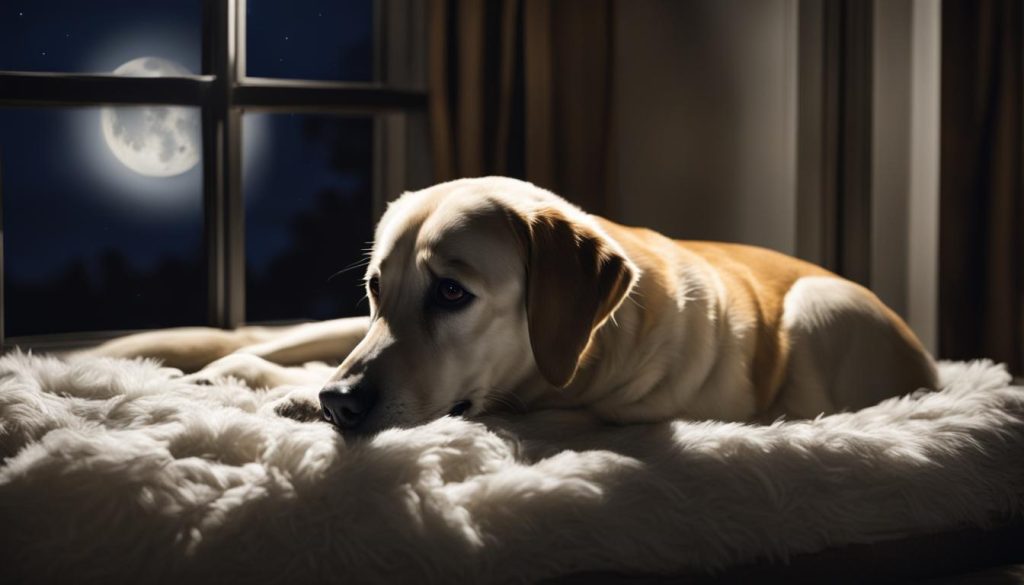
Dogs pant as a way to regulate their body temperature, similar to how humans sweat. This is their primary cooling mechanism. However, panting at night can also indicate other factors such as stress or discomfort. Understanding why dogs pant is crucial in determining the root cause of their panting at night.
Regulating Body Temperature
Panting in dogs serves as their primary method of cooling down. Dogs do not have sweat glands like humans, so they rely on panting to release excess heat from their bodies. When a dog pants, moisture is evaporated from their tongue and respiratory tract, which helps to dissipate heat.
Stress and Discomfort
In addition to temperature regulation, panting can also be a sign of stress or discomfort in dogs. Anxiety, fear, pain, or illness can all contribute to excessive panting in dogs, particularly at night. If your dog is frequently panting in a cool environment and shows other signs of distress, it is important to investigate further to determine the underlying cause.
Recognizing Panting at Night
Panting at night may be more noticeable because it is often quieter and there are fewer distractions. If your dog is panting heavily at night, it is important to observe their behavior and look for other signs of discomfort or distress. This can help you identify any potential underlying health issues or environmental factors that may be contributing to their panting.
Seeking Veterinary Care
If you are concerned about your dog’s excessive panting at night, it is always best to consult with a veterinarian. They can conduct a thorough examination, perform diagnostic tests if necessary, and provide guidance on how to address the underlying cause of your dog’s panting. Remember, every dog is unique, and what may be normal for one dog may not be for another.
| Causes of Dog Panting at Night |
|---|
| Regulating body temperature |
| Stress and discomfort |
| Underlying health issues |
| Anxiety or fear |
| Pain or illness |
Reasons Why Your Dog Is Panting at Night

Dogs pant at night for various reasons, including respiratory issues, anxiety, and underlying health problems. Identifying the cause of your dog’s panting behavior is crucial in order to provide appropriate care and ensure their well-being. Here are some common factors that may contribute to your dog panting at night:
1. Respiratory Issues:
Dogs with respiratory issues, such as Cushing’s Disease or genetic predispositions in certain breeds, may experience panting at night. It is important to consult with a veterinarian to determine the underlying cause and develop a treatment plan.
2. Anxiety:
Anxiety can also cause panting in dogs, especially at night. Loud noises, separation anxiety, and changes in the home environment can all contribute to anxiety-induced panting. Behavioral training, calming aids, and medication may be helpful in managing your dog’s anxiety and reducing panting at night.
3. Health Issues:
Underlying health problems such as anemia and heart disease can lead to panting in dogs during sleep. Anemia, which is characterized by a decrease in red blood cells, can cause increased heart rate and panting. Dogs with heart disease may experience difficulty breathing, coughing, and panting due to the strain on their cardiovascular system. It is essential to seek veterinary care for proper diagnosis and treatment of these health issues.
Understanding the reasons behind your dog’s panting at night is the first step in addressing this behavior and ensuring their comfort and well-being. Consulting with a veterinarian and following their recommendations will help you provide the best care for your furry friend.
| Reasons for Dog Panting at Night | Treatment Options |
|---|---|
| Respiratory Issues |
– Consult with a veterinarian – Develop a treatment plan based on the underlying cause |
| Anxiety |
– Behavioral training – Calming aids – Medication |
| Health Issues |
– Seek veterinary care for proper diagnosis – Follow recommended treatment options |
How to Treat Your Dog Panting At Night
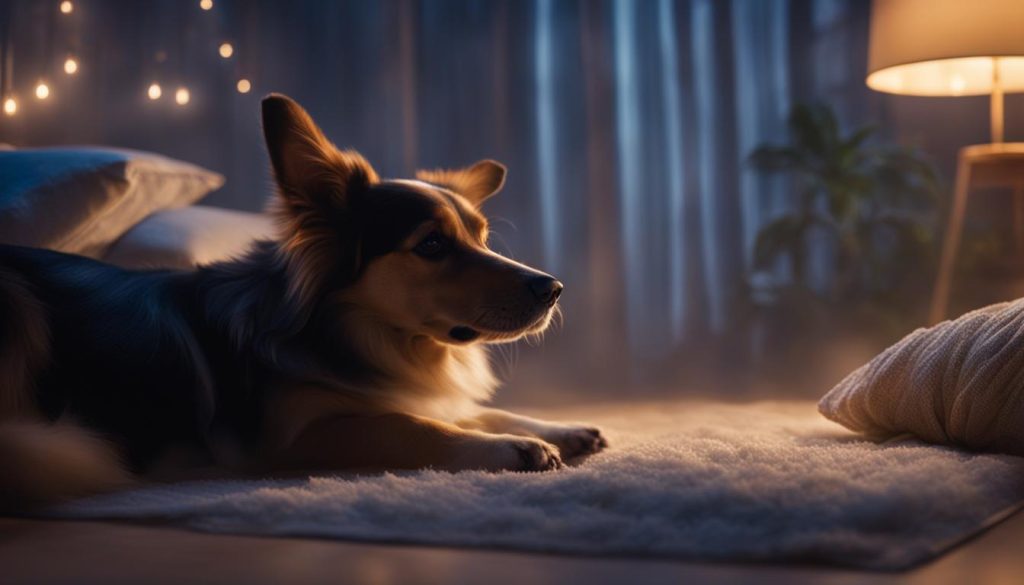
Addressing excessive dog panting at night requires a tailored approach based on the underlying cause. Here are some strategies to manage and treat your dog’s panting:
- Consult with a veterinarian: If your dog is panting heavily at night, it’s important to seek professional advice. A vet can assess your dog’s overall health and determine the underlying cause of the panting.
- Behavioral training: If anxiety is the root cause of your dog’s panting, working with a professional dog trainer or behaviorist may help reduce their stress levels and alleviate the panting episodes.
- Medication: In some cases, medication may be prescribed to manage excessive panting caused by anxiety or certain health conditions. Your vet can recommend appropriate medications based on your dog’s specific needs.
- Treatment for underlying health issues: If panting is related to an underlying health condition, such as anemia or heart disease, your vet will develop a treatment plan tailored to your dog’s needs. This may involve medications, dietary changes, or other interventions.
Possible Treatment Options for Specific Causes:
Depending on the cause of your dog’s panting, the treatment options may vary:
| Cause | Treatment Options |
|---|---|
| Anxiety | Behavioral training, medication, calming aids |
| Respiratory issues | Veterinary intervention, medication |
| Anemia | Address underlying cause, dietary changes, medication |
| Heart disease | Medication, management of symptoms, regular check-ups |
Panting at night in dogs can be attributed to various factors, including metabolic disorders, genetics, anxiety, anemia, age-related changes, and heart disease. Proper identification of the underlying cause is essential in addressing the behavior and ensuring your dog’s overall wellbeing. It is recommended to consult with a veterinarian for a thorough evaluation and appropriate treatment options for your dog’s panting at night.
Metabolic Disorders
Metabolic disorders in dogs can contribute to excessive panting, and one such disorder is Cushing’s Disease. This condition is characterized by the overproduction of cortisol, a hormone that regulates various bodily functions. Dogs with Cushing’s Disease may exhibit symptoms such as increased appetite, weight gain, and excessive panting. If you notice these signs in your dog, it is important to seek veterinary care for proper diagnosis and treatment.
In addition to Cushing’s Disease, other metabolic disorders like diabetes can also lead to panting in dogs. Diabetes affects the body’s ability to regulate blood sugar levels, and dogs with this condition may experience increased thirst, frequent urination, and panting as a result. If you suspect a metabolic disorder is causing your dog’s panting at night, it is crucial to consult with a veterinarian to determine the best course of action.
| Metabolic Disorders in Dogs | Symptoms | Treatment |
|---|---|---|
| Cushing’s Disease | Increased appetite, weight gain, excessive panting | Veterinary care and medication |
| Diabetes | Increased thirst, frequent urination, panting | Regulated diet, insulin therapy |
Proper diagnosis and management of metabolic disorders are crucial in addressing your dog’s panting at night. Your veterinarian will be able to provide you with the necessary guidance and treatment options to ensure your dog’s wellbeing.
Genetics
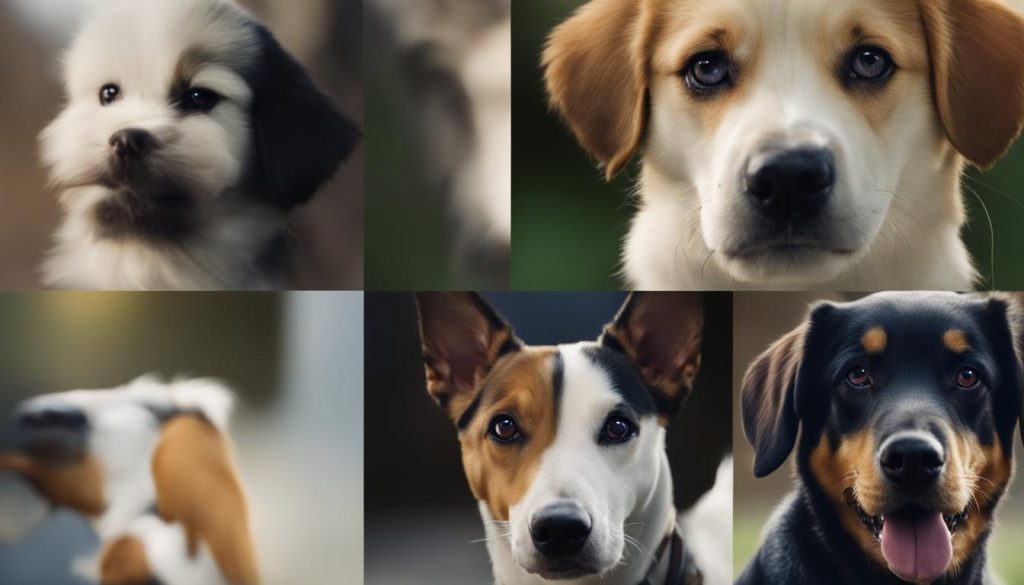
Some dog breeds are genetically predisposed to breathing problems, and one common condition is brachycephalic syndrome. Breeds such as French Bulldogs, English Bulldogs, and Pugs have shorter airways, which can result in breathing difficulties and panting, especially at night.
This breed-related issue is important to be aware of as it can significantly impact a dog’s quality of life. Dogs with brachycephalic syndrome may struggle to breathe properly, leading to panting, snorting, and even choking episodes. This can cause discomfort and distress for the dog, particularly during sleep.
To manage breathing issues in certain dog breeds, it is vital to provide appropriate care and attention. Keeping the dog in a cool and well-ventilated environment can help alleviate some of the symptoms. Additionally, regular exercise and maintaining a healthy weight can contribute to better respiratory function. However, it is crucial to consult with a veterinarian for a thorough evaluation and tailored guidance on managing breathing issues in specific breeds.
Common Breeds Prone to Breathing Problems:
- French Bulldog
- English Bulldog
- Pug
- Boston Terrier
- Pekingese
- Shih Tzu
Signs of Breathing Problems in Dogs:
- Excessive panting
- Struggling to catch their breath
- Snorting or wheezing sounds
- Choking or gagging episodes
- Restlessness or discomfort during sleep
Recognizing these signs in your dog can help you take appropriate action and seek medical care if necessary. Prompt veterinary attention is essential to manage respiratory issues and ensure the well-being of your furry companion.
Anxiety in Dogs: A Common Cause of Panting at Night
Dogs, like humans, can experience anxiety, and it is not uncommon for this anxiety to manifest as panting, especially at night. Recognizing the signs of anxiety in dogs is crucial in managing this behavior and ensuring their overall well-being. Some common signs of anxiety in dogs include restlessness, pacing, excessive panting, trembling, and destructive behavior. If you notice these signs in your canine companion, it is important to address their anxiety to provide them with the care and support they need.
Managing anxiety in dogs requires a multi-faceted approach. One effective method is behavioral training, which can help your dog learn coping mechanisms and reduce their anxiety over time. Positive reinforcement techniques, such as reward-based training, can help create a positive association with stressful situations.
Quote: “Anxiety in dogs can cause a range of behavioral changes, including excessive panting. It’s important for pet owners to understand the signs of anxiety in their dogs and work with a veterinarian to develop a tailored treatment plan.”
– Dr. Emily Smith, Veterinarian
In some cases, calming aids such as pheromone diffusers or vests can be used to alleviate anxiety in dogs. These products release calming scents or apply gentle pressure to help dogs feel more secure and relaxed. Additionally, medication may be prescribed by a veterinarian for dogs with severe anxiety that significantly impacts their quality of life.
It is important to remember that every dog is unique, and what works for one dog may not work for another. Therefore, it is essential to consult with a veterinarian who can assess your dog’s individual needs and provide guidance on the most appropriate methods for managing their anxiety.
| Signs of Anxiety in Dogs | Managing Anxiety in Dogs |
|---|---|
|
|
Anemia in Dogs and its Effects on Panting at Night
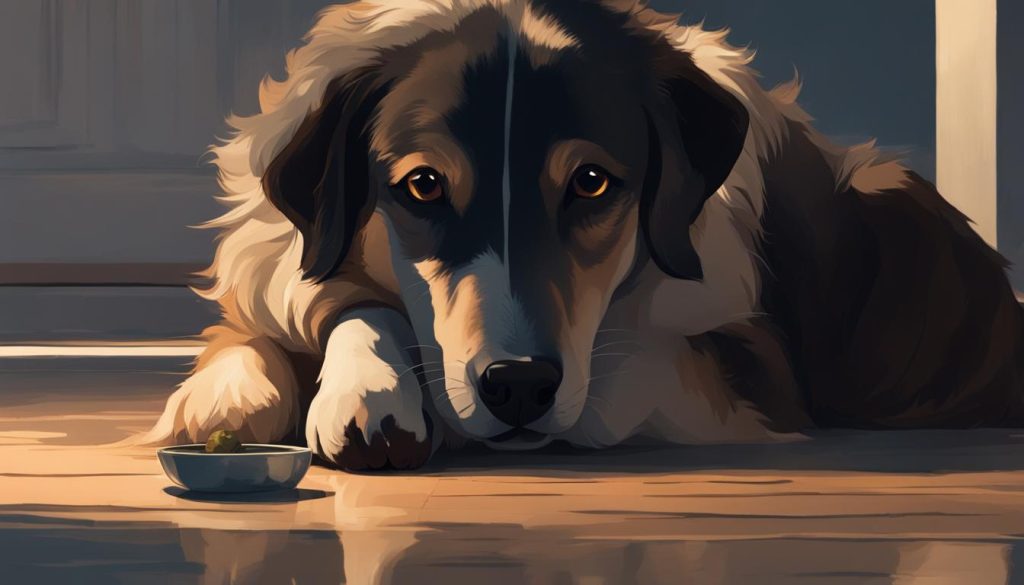
Panting at night in dogs can also be attributed to anemia, a condition characterized by a decrease in red blood cells. Anemia can lead to an increased heart rate and panting as the body tries to compensate for the lack of oxygen reaching the tissues. Symptoms of anemia in dogs may also include weakness, loss of appetite, and fatigue. If you suspect that anemia is the cause of your dog’s panting at night, it is important to consult with a veterinarian for a proper diagnosis and treatment.
Managing anemia in dogs involves addressing the underlying cause. This could involve treating any underlying health conditions that are contributing to the anemia, such as kidney disease or gastrointestinal bleeding. Additionally, your veterinarian may recommend dietary changes or supplementation to help increase your dog’s red blood cell count. Regular check-ups and follow-up blood tests will be necessary to monitor your dog’s progress and adjust the treatment plan as needed.
It is important to recognize that anemia can have serious health implications for your dog, so prompt veterinary attention is crucial. By addressing the underlying cause of anemia and implementing appropriate treatment measures, you can help alleviate your dog’s symptoms and improve their overall well-being.
| Cause | Symptoms | Treatment |
|---|---|---|
| Underlying health conditions | Weakness, loss of appetite, fatigue | Treating the underlying condition, dietary changes, supplementation |
| Dietary deficiencies | Weakness, pale gums, rapid breathing | Dietary changes, iron supplements |
| Blood loss | Pale gums, low energy, rapid heartbeat | Addressing the source of the bleeding, blood transfusions if necessary |
Panting in Senior Dogs: Understanding the Impact of Age on Sleep-Wake Cycle
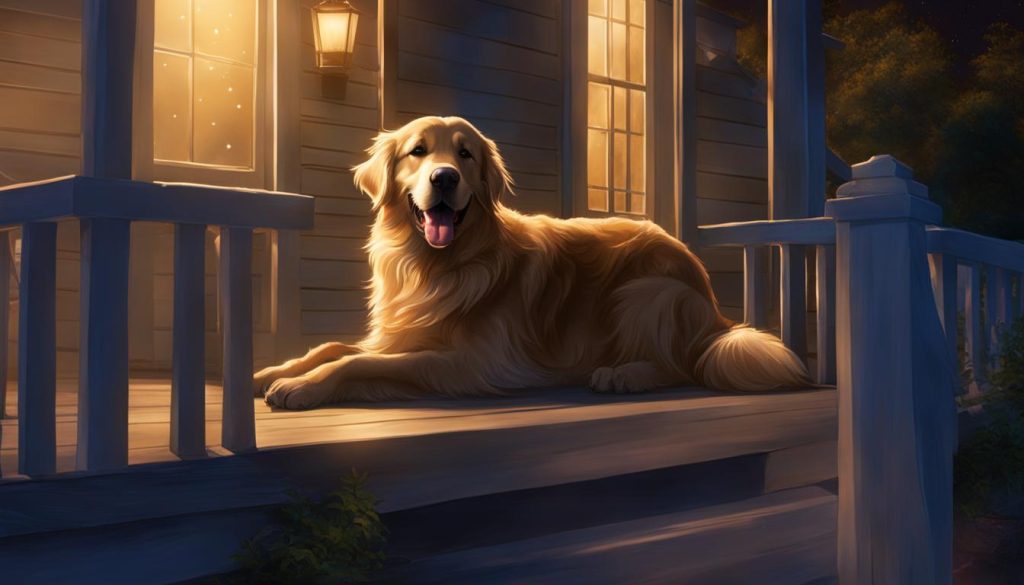
As dogs age, they may experience changes in their sleep patterns and behaviors. Panting at night in senior dogs can be a common occurrence and is often linked to age-related factors such as cognitive dysfunction and disruptions in the sleep-wake cycle.
Cognitive dysfunction is a condition that affects older dogs and is similar to Alzheimer’s disease in humans. It can cause disorientation, confusion, and changes in behavior, including restlessness and panting at night. These symptoms can be distressing for both the dog and their owner, but there are ways to manage them.
One approach is to provide a comfortable sleeping environment for your senior dog. Ensure they have a cozy bed in a quiet area of the house, away from noise and distractions. You can also try using a white noise machine or a calming diffuser to promote relaxation and reduce anxiety.
Managing Panting in Senior Dogs
It’s important to consult with your veterinarian if your senior dog is panting excessively at night. They can help determine if there are any underlying health issues contributing to the panting and recommend appropriate treatment options. In some cases, medication may be prescribed to alleviate symptoms and improve your dog’s overall well-being.
Additionally, regular exercise and mental stimulation can help reduce restlessness and promote better sleep in senior dogs. Taking your dog for daily walks, providing interactive toys, and engaging in training exercises can all contribute to their overall health and happiness.
Remember, each senior dog is unique, and what works for one may not work for another. Be patient with your furry companion and consult with your veterinarian for personalized advice and guidance. With proper care and attention, you can help your senior dog find comfort and restful nights.
Panting in Dogs with Heart Disease: Symptoms and Impact on Breathing
Dogs with heart disease often exhibit panting as a prominent symptom, along with other signs of heart failure. Panting in dogs with heart disease is not simply a result of physical exertion or heat, but rather a manifestation of the strain on their cardiovascular system. It is important for dog owners to understand the symptoms of heart failure and the impact of heart disease on their pet’s breathing.
The most common symptoms of heart failure in dogs include coughing, difficulty breathing, and panting, especially during rest or at night. This is due to the impaired ability of the heart to pump blood effectively, resulting in fluid accumulation in the lungs. As a result, dogs may experience labored breathing and increased respiratory effort, leading to panting as they struggle to take in sufficient oxygen.
Heart disease can significantly impact a dog’s quality of life, making it essential to seek veterinary care for proper diagnosis and treatment. A thorough evaluation, including physical examination, diagnostic tests, and imaging, will help determine the extent and nature of the heart disease. Treatment options may include medication to manage heart function, dietary changes, and lifestyle modifications to reduce the strain on the heart.
Table: Common Symptoms of Heart Failure in Dogs
| Symptom | Description |
|---|---|
| Coughing | Persistent or frequent cough, especially during rest or exercise |
| Difficulty breathing | Labored breathing, shortness of breath, or rapid breathing |
| Panting | Excessive and unexplained panting, particularly at rest or during sleep |
| Weakness and fatigue | Lethargy, decreased energy levels, and reduced activity |
| Fluid retention | Swollen abdomen or limbs due to fluid accumulation |
Early detection and management of heart disease in dogs are crucial for improving their prognosis and quality of life. Regular check-ups with a veterinarian, along with monitoring for any changes in breathing patterns or other symptoms, are essential for timely intervention. With proper care and treatment, dogs with heart disease can lead comfortable lives and enjoy their time with their loving owners.
Wrapping Up
To summarize, understanding why dogs pant at night is crucial in addressing this behavior and ensuring their overall well-being. It can be attributed to various factors including metabolic disorders, genetics, anxiety, anemia, age-related changes, and heart disease. By properly identifying the underlying cause, you can take appropriate steps to address the issue.
If you suspect your dog is experiencing night time panting, it is recommended to consult with a veterinarian for a thorough evaluation. They will be able to provide a proper diagnosis and recommend suitable treatment options based on your dog’s specific needs.
Remember, addressing dog panting requires a holistic approach. In addition to medical intervention, it is important to create a calm and comfortable environment for your dog. Providing proper exercise, mental stimulation, and reducing stressors can also help alleviate panting at night.
By understanding canine respiratory issues and working closely with your veterinarian, you can ensure that your dog receives the best possible care and support for their panting at night.
FAQ
Why is my dog panting at night?
Dogs pant at night for various reasons, including regulating their body temperature, alleviating anxiety, or due to underlying health issues.
What are the common reasons why dogs pant at night?
Dogs may pant at night due to respiratory issues, anxiety, underlying health problems such as anemia or heart disease, or age-related factors.
How can I treat my dog’s panting at night?
The treatment for dog panting at night depends on the underlying cause. It may involve behavioral training, medication, or veterinary intervention, depending on the specific issue.
What are metabolic disorders in dogs?
Metabolic disorders, such as Cushing’s Disease, can cause excessive panting in dogs. Symptoms may include increased appetite, weight gain, and panting.
Are certain dog breeds more prone to breathing problems?
Yes, some dog breeds, such as French Bulldogs, English Bulldogs, and Pugs, are genetically predisposed to breathing difficulties, which can result in increased panting at night.
How can I manage anxiety-induced panting in my dog?
Managing anxiety in dogs may involve behavioral training, the use of calming aids, or medication, depending on the severity and cause of the anxiety.
What are the symptoms of anemia in dogs?
Symptoms of anemia in dogs may include weakness, loss of appetite, fatigue, and increased heart rate, which can contribute to excessive panting at night.
How does age affect dog panting at night?
Older dogs may experience panting due to age-related factors such as cognitive dysfunction, which disrupts the sleep-wake cycle, or underlying health conditions like anemia and Cushing’s Disease.
Can heart disease cause panting in dogs at night?
Yes, dogs with heart disease may exhibit panting, coughing, and difficulty breathing, especially at night, due to the strain on their cardiovascular system.
How can I address my dog’s panting at night?
Proper identification of the underlying cause is crucial in addressing dog panting at night. Consultation with a veterinarian is recommended for a thorough evaluation and appropriate treatment options.


